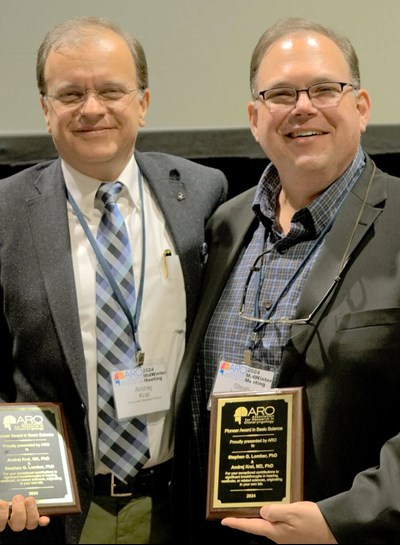 The ARO Pioneer Award in Basic Science for 2024 has been given to Dr Andrej Kral and Dr Stephen G Lomber in recognition of their fundamental work on understanding brain plasticity after hearing loss.
The ARO Pioneer Award in Basic Science for 2024 has been given to Dr Andrej Kral and Dr Stephen G Lomber in recognition of their fundamental work on understanding brain plasticity after hearing loss.
The award, which is for a body of work representing a significant advance in hearing, vestibular or related science, was given by the Association for Research in Otolaryngology at the 47th Annual Midwinter meeting in Anaheim, CA, USA, 3–7 February 2024.
Severe-to-profound hearing loss can be defeated with cochlear implants. For this intervention to be effective, however, it is critical to understand how the absence of auditory input affects the brain. The cerebral cortex is a complex, yet efficient, sensory processing structure. External inputs received through the sensory organs early in development help to establish sensory maps in cortex.
Dr Andrej Kral (left) and Dr Stephen G Lomber (right) after receiving their awards.
Dr Kral, who is Chaired Professor of Auditory Neuroscience at Hanover Medical School, and Dr Lomber, who is Professor of Physiology, Psychology, Neurology and Neurosurgery, and Biomedical Engineering at McGill University, made significant advances in understanding how the brain adapts to early sensory experience and deafness. Their research programmes are guided by the question: “How does sensory experience influence brain development and cortical plasticity?”
Kral’s team observed that cortical development is modified in congenital deafness. Long-term experience with cochlear implant stimulation could compensate for early deafness, but only if the restoration of hearing was accomplished early, within a juvenile critical period. This provided part of the evidence base for early cochlear implantation, as is now common practice in children.
Based on Lomber’s innovative approaches to cortical function, combining physiology and behaviour that allowed new insights in visual and auditory function, Lomber and Kral teamed together to investigate crossmodal effects of deafness. They found that early deafness induces regions of auditory cortex to process visual input, in place of the missing acoustic input, switching the sensory processing of a given auditory area, but not the behaviours that would normally be conducted by that region.
This fundamental observation has been key for understanding crossmodal plasticity and its limitations. They further studied structural auditory connectivity in deafness. In addition to discovering how the auditory cortex responds to hearing loss and restoration, their work has also revealed basic properties of cerebral organisation and development. The work of Kral and Lomber has transformed our understanding of cerebral organisation in the deaf and of the cortical consequences of restoring acoustic input to a deprived auditory system.
The Association for Research in Otolaryngology will start accepting nominations for the ARO Pioneer Award in Basic Science in July 2024.



